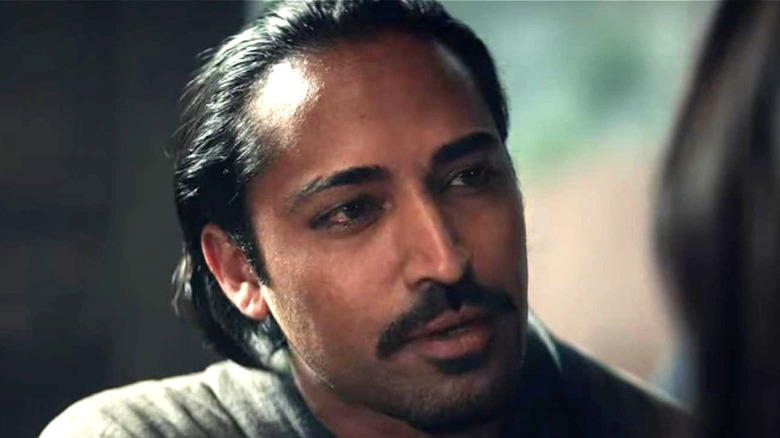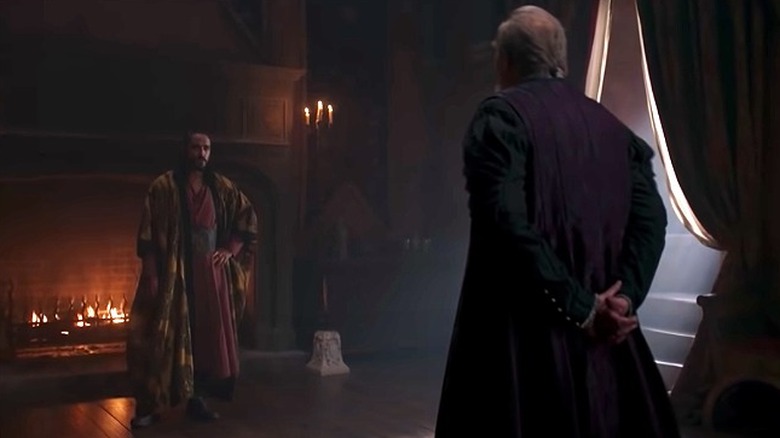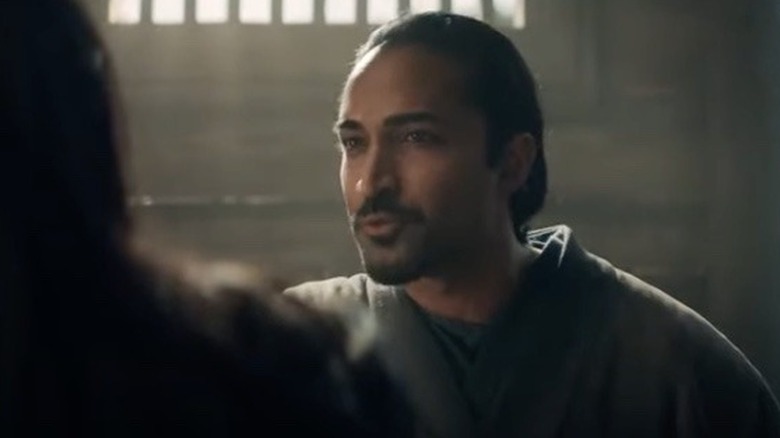The Deleted Witcher Season 2 Scene That Would Change Everything About Vilgefortz
On December 20th, Netflix Geeked's insightful glimpse into the talent and thinking behind "The Witcher" Season 2, "The Witcher: Unlocked," treated viewers to a variety of cast interviews, a Q&A with the series' showrunner and executive producer, Lauren Schmidt Hissrich, and, perhaps most excitingly, a handful of deleted scenes. Among those scenes was a tense and revealing conversation between Mahesh Jadu's mysterious Vilgefortz and his political rival in The Brotherhood, the wizard Stregobor (Lars Mikkelsen). In addition to shedding some light on Stregobor's attitude toward the young warrior mage, the scene could have revealed more than the season was ready to with regard to Vilgefortz's complicated relationship to The Brotherhood, as well as how his background might shape his future motivations.
While it's all too easy for fans of the series' source material — Andrzej Sapkowski's short stories and novels (or even fans of the CD Projekt RED games) — to cast a shadow of potentially inaccurate predictions over the Netflix adaptation, in order to understand why this particular scene was cut, it's best to look only to what portion of Vilgefortz' story in Season 2 actually revealed. We know, for instance, that the former soldier, battle-hardened mage, and military strategist is working with Tissaia de Vries (MyAnna Buring) to overthrow Stregobor and Artorius Vigo (Terence Maynard) to take control of The Brotherhood.
Since neither Stregobor nor Artorius come off as particularly likable or rational characters (both harbor an immense hatred for, and distrust of, anyone with even a fraction of Elven blood, including Anya Chalotra's Yennefer), it's difficult not to root Vilgefortz, despite the fact that he's had some unseemly, if unexplained moments himself. That said, there's still a lot we don't know about the enigmatic mage, but almost learned via a key deleted scene.
Season 2 almost spilled the beans on Vilgefortz' past
The scene sees Vilgefortz and Stregobor go head-to-head regarding both the former's desire to lead The Brotherhood and the latter's refusal to accept that Yennefer won't betray it. Over the course of their dialogue, we learn (from Stregobor's judgmental comments) that Vilgefortz was "born of a prostitute, abandoned in a sewer," and had his magic "shaped by the ignorant druids who picked (him) up." He became a mage much later in life than most, and never attended Ban Ard or any other esteemed magic school.
Vilgefortz insists that his life experiences are the key to his value, and "honed his instincts" with regard to the Battle of Sodden Hill, but Stregobor is unimpressed. After ranting and raving about Yennefer for a bit (Stregobor's favorite thing to do) he suggests Vilgefortz understands her "rage and tempestuousness" all too well. There's plenty that isn't revealed in their curt exchange of approaches to the safety of The Brotherhood, but we do see, for the first time, that Vilgefortz is a bit of an outsider. Moreover, he's spent the better part of his life having to fend for and defend himself, which means he owes little loyalty to the likes of Stregobor and Artorius.
The writers felt it was 'way too soon' to include the scene
Without giving too much away (since we can't say for sure how closely Season 3 will follow its source material) much of this same information is divulged in Andrzej Sapkowski's "The Time of Contempt," only, in the novel, Vilgefortz reveals his past to Geralt in an attempt to seduce the Witcher into forming an alliance (p. 141-143). An alliance against whom, you ask? The answer to that question lies at the heart of "The Witcher" writers' decision not to include the deleted scene.
In "The Witcher: Unlocked," Hissrich explained that the writers' room "talked a lot about how to roll out the information about Vilgefortz," since the character has such a "deep story." After much discussion, the team ultimately decided it was "way too soon" to dive fully into Vilgefortz's complex motivations and history. Had the scene remained, viewers would no doubt already be wondering how Vilgefortz' alternative upbringing might play into (for instance) his insistence on finding Ciri (Freya Allan), or his willingness to go against Tissaia's wishes with regard to sharing the sensitive information surrounding Ciri's existence and import.


